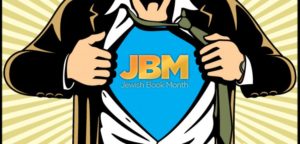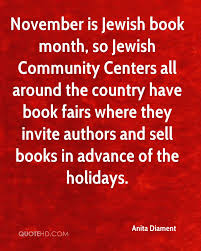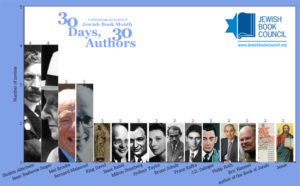“Don’t forget; Jewish people read an enormous amount,†my lovely (and Jewish) literary agent said before my book launch. “We really love books.â€
I nodded. Yes, I knew that—at least I knew it inasmuch as I was Jewish and I read—as did my mother, my sister, and my daughters, but could I raise that sample to the status of landslide? Discerning what was true in my culture was fraught with difficulty. I grew up with a slight case of anomie, surrounded by a cultural belief that all-things-Jewish=equals families-pushing-one-towards-great-achievement, while, among other family oddities, my grandmother taught me to shoplift.
I was unclear what being Jewish meant or if I belonged.
Today, as I get ready to travel to NYC, readying to again try out for the Jewish Book Council sponsored author tours, this time for The Widow of Wall Street, I bring back my memories of my first travels, with this essay written in 2011.
When  I had the great good fortune of being invited to participate in Jewish Book Festival, I finally felt the full impact of being welcomed into the larger Jewish community, during Jewish Book Month and beyond.
Jewish Book Month, according to the overseeing Jewish Book Council is “an annual event on the American Jewish calendar dedicated to the celebration of Jewish books. It is observed during the month proceeding Hanukkah, thus the exact date changes from year to year.â€
For writers, this translates to: if you’re a Jewish author, or wrote a Jewish-themed book, or have written a book of interest to the Jewish community, you can participate in a massive authorial version of American Idol. Call it Jewish Writer Idol, only rather than one winner, there are many, and the chosen ones speak at some number of the over 100 Jewish Book Festivals. If you scale the steps (applications, sending books, etc) you earn the right to sit in Hebrew Union College, crowded thigh-to-thigh in a roomful of other authors, seated before representatives of the various festivals. You’ll have 2 short (or, in some cases, seemingly endless) minutes to convince the audience to pick your book. The not-thanked-enough audience sits through endless afternoon and evening sessions, until the books must merge into one giant mybookillustrateswithdepthandcaring.
Afterward, the audience returns home to read boxes of books before the picks are chosen, traded, and who-knows-what. (I actually know almost nothing about what goes on behind the closed doors—but I imagine it as a giant book debate, perhaps like a continent-wide game of Monopoly.)
Meanwhile, I experienced the nerd equivalent of Rush Week, waiting to see if I got any invitations; then becoming totally Sally Field when they arrived: They liked me! They really liked me!
And then I flew around the country. How to describe the feeling of walking into these Jewish Community Centers filled with readers eager to hear from you? I felt as though I were finally meeting every aunt, uncle, and cousin I’d ever wished for.
Warmth and love was present everywhere: In Columbus, Ohio I had the pleasure of pairing up with local anti-domestic violence groups (based on themes in my novel) and within the event, moving from discussing my book to considering best practices for prevention. The JCC bookstore was heaped with books I wanted to read. Pure gold. (Plus I got to have dinner with my much-admired online author friend Carla Buckley.)
Unless I’m kidding myself, I made friends for life. Detroit knocked me over. I walked into their “Book Club Night†to be greeted by over 300 men and women. Somehow, in this large insightful crowd, we became an intimate group of friends discussing details of writing and life. (It’s also where I gushingly embarrassed myself by sharing with my 300+ personal friends my admiration of the upcoming author Darin Strauss.
I’m still red-faced. Moral of story: 300 people do not hold secrets.
The world can be mighty small for a minority: I learned that playing Jewish geography in San Diego. Along with being spellbound by how enraptured they were with books, I discovered connections to high school, camp, college, and most important—to the Jewish Federation of Philanthropy, who saved my life as a child. I had the thrill of seeing that they nurtured authors from both large and small presses, such as my friend Ellen Meeropol, a Red Hen author. It was also here that I finally met Lois Alter Mark in person, who introduced me to Miriam Mendoza’s sad and yet emboldening story of her family’s encounter with domestic homicide.
Have I mentioned food? I flew at 6 AM from San Diego to St. Louis. There the joy of presentation and forming a mutual admiration society with co-panelist, author Alyson Richman (whose book gripped me the entire flight home) mingled with a hospitality that still warms me today. Local children’s author, Jody Feldman saved my life with coffee and caring when she greeted me (inside!) at the airport. The next morning, Alyson, the moderator, Ellen Futterman, editor of the St. Louis Jewish Light, and I, were treated to breakfast and an opportunity to meet each other before our event.  After the incredibly well-attended and joyous morning (with Alyson and I now firmly in love) we were taken out to a magnificent multi-course lunch.
By now, I was considering moving to the Midwest.
The food theme continued in Virginia Beach. A tower of desserts gilded the Book Club Night. Seated in a stuffed armed chair, I spoke with a group of women and men who’d not only read my book, but came armed with deeply moving questions and consideration. Again paired with a local domestic violence group—and again I was struck by community connections, dedication to helping, and the commitment to books and life-long learning. I was picked up for the event by a woman filled with the spirit of generosity and family, and driven back to my hotel by her mother—a woman who dedicated part of her retirement to teaching children to read
Back home, I got a few snappish reactions from non-Jewish writer friends, usually along the lines of, “Why isn’t there a Wasp book festival?†(I bit my tongue against saying: There is. It’s called life,) put off by the exclusionary nature of the events. To me, it’s a way for a tiny percentage (.02 %) of the world, a percentage sharply cut by the Holocaust, to celebrate how despite a history of oppression and anti-semitism, we became strong at the broken places—and are diverse enough to include those as different as Dr. Izzeldin Abuelaish, an advocate for peace in the face of devastating personal tragedy, Susan Orlean, author of Rin Tin Tin: The Life and the Legend, and Rabbi Andrea Myers, once a Lutheran, now a member of the New York Board of Rabbis, as well as a lesbian who was active in New York’s fight to recognize gay marriage, in the celebration.
Every community I visited brought remembrance of the past and hopeful embrace of the future. On a personal level, they provided not only an opportunity to talk about my book, but my anomie is greatly ameliorated. Being Jewish means a host of things—including ensuring provision of a big tent. I was invited, I felt cherished, and I belonged.
And, as my agent wisely said: Jewish people really love books.
(originally published in 2011)


